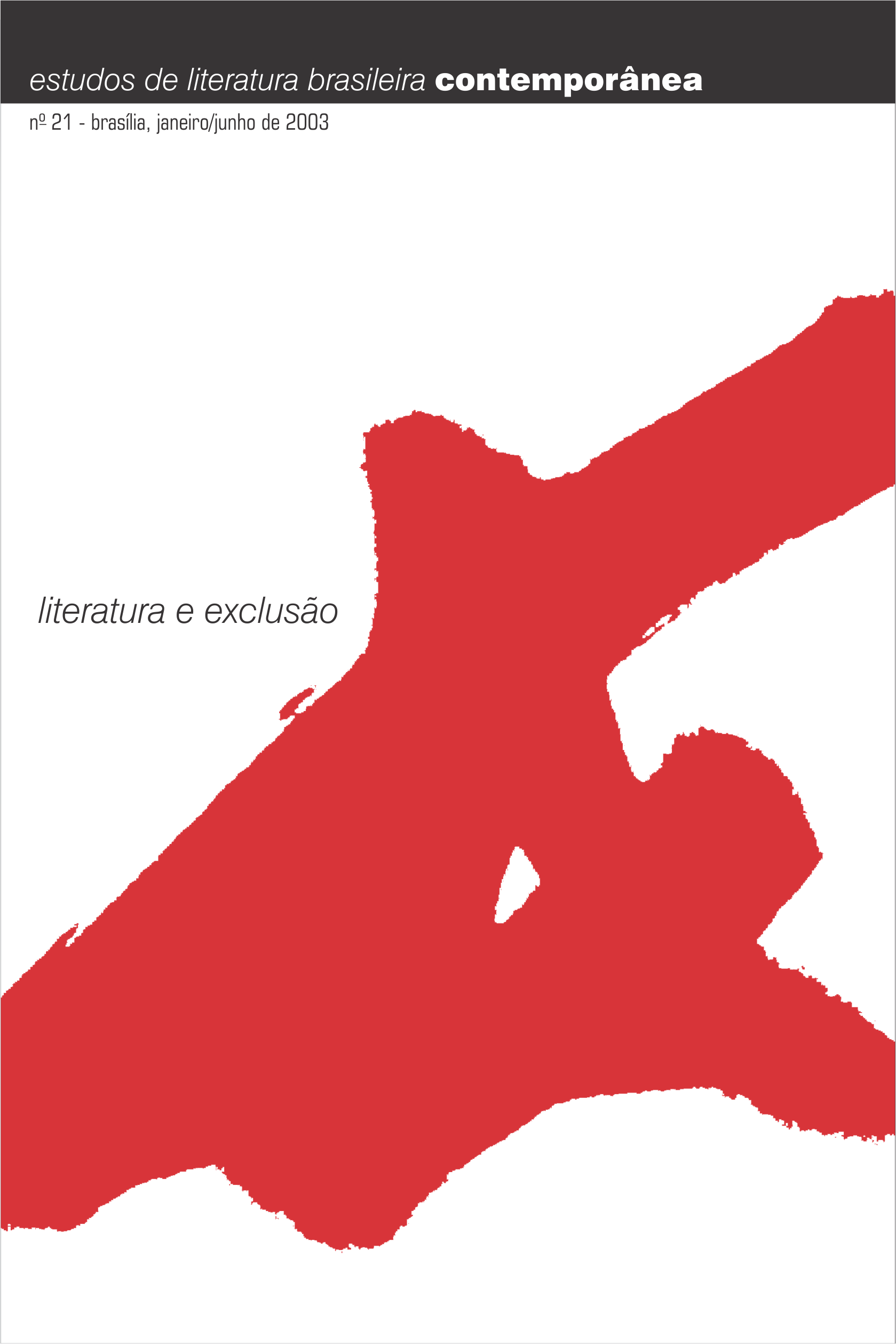Criadas no more:
notas sobre testemunhos de empregadas domésticas
Abstract
Criadas no more: notas sobre testemunhos de empregadas domésticas
References
BARTHES, Roland. Oeuvres complètes. Paris: Éditions de Seuil, 1995.
CAMARGO, Maria Sílvia & ISIDORO, Cristiana. Mulher & trabalho: 32 histórias. São Paulo: Editora 34, 1997.
FRANCO, Jean. “ Going Public: reinhabiting the private”, em M. L. PRATT e K.
NEWMAN (eds.), Critical passions: selected essays. Durham: Duke University Press, 1999.
GIRON, Luís Antônio. “Pena de Sangue”.Cult, nº 34. São Paulo, 2001.
HIGMAN, B. W.; GRAHAM, Sandra Lauderdale. “Servants and masters in Rio de Janeiro: perceptions of house and street in the 1870s”, em E. CHALNEY e M. G.
CASTRO (eds.), Muchachas no more: household workers in Latin America and the Caribbean. Philadelphia: Temple University Press, 1989.
JABOR, Arnaldo. “Cidade de Deus desmascara nossa crueldade”. Globo On Line, Rio de Janeiro, 1º de setembro de 2002.
KAUFMANN, Tania. A aventura de ser dona de casa (dona de casa x empregada): um assunto sério visto com bom humor. Rio de Janeiro: Artenova, 1975.
KOFFES, Suely. Mulher, mulheres. Campinas: Ed. Unicamp, 2001.
Maria, Maria: Revista do Fundo de Desenvolvimento das Nações Unidas para a Mulher (Unifem). Ano 4, nº 4. Segundo semestre de 2002.
MÁXIMO, João et al. “A nova arte engajada”. O Globo. Segundo Caderno. Domingo, 8 de setembro de 2002: 4-5.
MEIRELLES, Fernando & OLIVAL, Nando (prod. e dir.). Domésticas, o filme. 90 min. Roteiro: Fernando Meirelles, Nando Olival, Renata Melo e Cecília Homem de Mello. São Paulo: 02 Filmes, 2001.
MELLO, Cléa Côrrea. “O desafio crítico de Cidade de Deus”. Tempo Brasileiro, nº 141. Rio de Janeiro, 2000: 27-38.
MELO, Hildete Pereira de. “Feminists and domestic workers in Rio de Janeiro”, em E.
CHALNEY e M. G. CASTRO (eds.), Muchachas no more: household workers in Latin America and the Caribbean. Philadelphia: Temple University Press, 1989.
______ et al. “Domestic workers in Rio de Janeiro: their struggle to organize”, em E.
CHALNEY e M. G. CASTRO (eds.), Muchachas no more: household workers in Latin America and the Caribbean. Philadelphia: Temple University Press, 1989.
______. “O serviço doméstico remunerado no Brasil: de criadas a trabalhadoras”. Textos para Discussão - IPEA, nº 565. Rio de Janeiro, 1998.
______. “Nas bases da casa e da pirâmide social” (entrevista). Maria, Maria: Revista do Fundo de Desenvolvimento das Nações Unidas para a Mulher (Unifem), nº 4 Criadas no more (2002).
MOLLOY, Sylvia et al (eds.). Women’s writing in Latin America: an anthology. Boulder: Westview, 1991.
NOVA””Pesquisa, Assessoramento e Avaliação em Educação. “Só a gente que vive é que sabe: depoimento de uma doméstica”. Cadernos de Educação Popular, nº 4. Petrópolis, 1982: 9-78.
SAFFIOTI, Helleieth. Emprego doméstico e capitalismo. Rio de Janeiro: Avenir Editora, 1979.
SCHWARZ, Roberto. “Nunca fomos tão engajados”, em Seqüências brasileiras: ensaios. São Paulo: Companhia das Letras, 1999.
SILVA, Francisca Souza da. Ai de vós!: diário de uma doméstica. Rio de Janeiro: Civilização Brasileira, 1983.
Downloads
Published
Issue
Section
License
Authors who publish in this journal agree to the following terms:
a) The authors maintain the copyright and grant the journal the right of first publication, the work being simultaneously licensed under the Creative Commons Attribution License-Non Commercial 4.0 which allows the sharing of the work with acknowledgment of the authorship of the work and publication this journal.
b) Authors are authorized to enter into additional contracts separately, for non-exclusive distribution of the version of the work published in this journal (eg publish in institutional repository or as a book chapter), with authorship recognition and publication in this journal.
c) Authors are allowed and encouraged to publish and distribute their work online (eg in institutional repositories or on their personal page) after the editorial process, as this can generate productive changes, as well as increase the impact and citation of published work (See The Effect of Free Access).
d) The authors of the approved works authorize the magazine to, after publication, transfer its content for reproduction in content crawlers, virtual libraries and the like.
e) The authors assume that the texts submitted to the publication are of their original creation, being fully responsible for their content in the event of possible opposition by third parties.


